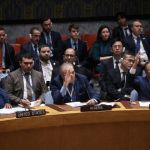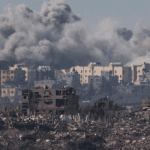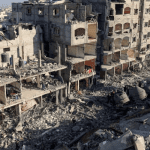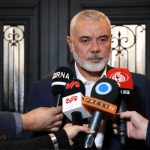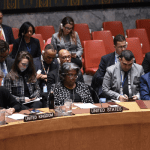The US has proposed a draft resolution at the UN Security Council which calls for a temporary ceasefire in Gaza.
It has also warned Israel against invading the overcrowded city of Rafah.
The US has previously avoided the word “ceasefire” during UN votes on the war, but President Joe Biden has made similar comments.
However, the US plans to veto another draft resolution – from Algeria – which calls for an immediate humanitarian ceasefire.
More than a million displaced Palestinians, who represent about half of Gaza’s population, are crammed into Rafah after being forced to seek shelter there.
The southern city, which borders Egypt, was home to only 250,000 people before the war.
Many of the displaced are living in makeshift shelters or tents in squalid conditions, with scarce access to safe drinking water or food.
The UN has issued its own warning that a planned Israeli offensive in the city could lead to a “slaughter”.
Israel launched its operations in Gaza following an attack by Hamas gunmen on southern Israel on 7 October, during which about 1,200 people were killed and more than 240 others taken hostage.
The Israeli military campaign has killed 29,000 people in the Palestinian territory, according to the Hamas-run health ministry there.
Washington has come under immense international pressure to use its leverage to rein in Israel’s devastating operations, having spent much of the war emphasising its ally’s right to self-defence.
While it has vowed to block the Algerian draft, its rival text does register opposition to Israel’s plans.
Talks will begin on the US draft this week, but it is not clear when or if the proposal might be put to a vote. Under the UN charter, members “agree to accept and carry out” decisions made by the Security Council – in contrast with decisions made at the General Assembly, which are non-binding.
It is the first time the US has called for a temporary ceasefire in Gaza at the UN, having vetoed previous resolutions using the word.
The US draft also states that a major ground offensive in Rafah would result in more harm to civilians and their further displacement, including potentially into neighbouring countries – a reference to Egypt.
It also says such a move would have serious implications for regional peace and security.
The draft resolution calls for a temporary ceasefire in Gaza as soon as practicable, echoing remarks by President Joe Biden in his conversations with Israel’s Prime Minister Benjamin Netanyahu last week.
Mr Netanyahu has so far resisted international pressure to reconsider the plan – vowing to rescue remaining hostages and defeat Hamas throughout Gaza.
Israeli war cabinet member Benny Gantz has warned the manoeuvre will be launched unless Hamas frees all its hostages by 10 March. The date marks the start of Ramadan, the Islamic holy month of fasting.
The Arab group of nations says the Security Council cannot turn a deaf ear to the pleas of the international community demanding a ceasefire.
The US has proposed a draft resolution at the UN Security Council which calls for a temporary ceasefire in Gaza.
It has also warned Israel against invading the overcrowded city of Rafah.
The US has previously avoided the word “ceasefire” during UN votes on the war, but President Joe Biden has made similar comments.
However, the US plans to veto another draft resolution – from Algeria – which calls for an immediate humanitarian ceasefire.
More than a million displaced Palestinians, who represent about half of Gaza’s population, are crammed into Rafah after being forced to seek shelter there.
The southern city, which borders Egypt, was home to only 250,000 people before the war.
Many of the displaced are living in makeshift shelters or tents in squalid conditions, with scarce access to safe drinking water or food.
The UN has issued its own warning that a planned Israeli offensive in the city could lead to a “slaughter”.
Israel launched its operations in Gaza following an attack by Hamas gunmen on southern Israel on 7 October, during which about 1,200 people were killed and more than 240 others taken hostage.
The Israeli military campaign has killed 29,000 people in the Palestinian territory, according to the Hamas-run health ministry there.
Washington has come under immense international pressure to use its leverage to rein in Israel’s devastating operations, having spent much of the war emphasising its ally’s right to self-defence.
While it has vowed to block the Algerian draft, its rival text does register opposition to Israel’s plans.
Talks will begin on the US draft this week, but it is not clear when or if the proposal might be put to a vote. Under the UN charter, members “agree to accept and carry out” decisions made by the Security Council – in contrast with decisions made at the General Assembly, which are non-binding.
It is the first time the US has called for a temporary ceasefire in Gaza at the UN, having vetoed previous resolutions using the word.
The US draft also states that a major ground offensive in Rafah would result in more harm to civilians and their further displacement, including potentially into neighbouring countries – a reference to Egypt.
It also says such a move would have serious implications for regional peace and security.
The draft resolution calls for a temporary ceasefire in Gaza as soon as practicable, echoing remarks by President Joe Biden in his conversations with Israel’s Prime Minister Benjamin Netanyahu last week.
Mr Netanyahu has so far resisted international pressure to reconsider the plan – vowing to rescue remaining hostages and defeat Hamas throughout Gaza.
Israeli war cabinet member Benny Gantz has warned the manoeuvre will be launched unless Hamas frees all its hostages by 10 March. The date marks the start of Ramadan, the Islamic holy month of fasting.
The Arab group of nations says the Security Council cannot turn a deaf ear to the pleas of the international community demanding a ceasefire.
The US has proposed a draft resolution at the UN Security Council which calls for a temporary ceasefire in Gaza.
It has also warned Israel against invading the overcrowded city of Rafah.
The US has previously avoided the word “ceasefire” during UN votes on the war, but President Joe Biden has made similar comments.
However, the US plans to veto another draft resolution – from Algeria – which calls for an immediate humanitarian ceasefire.
More than a million displaced Palestinians, who represent about half of Gaza’s population, are crammed into Rafah after being forced to seek shelter there.
The southern city, which borders Egypt, was home to only 250,000 people before the war.
Many of the displaced are living in makeshift shelters or tents in squalid conditions, with scarce access to safe drinking water or food.
The UN has issued its own warning that a planned Israeli offensive in the city could lead to a “slaughter”.
Israel launched its operations in Gaza following an attack by Hamas gunmen on southern Israel on 7 October, during which about 1,200 people were killed and more than 240 others taken hostage.
The Israeli military campaign has killed 29,000 people in the Palestinian territory, according to the Hamas-run health ministry there.
Washington has come under immense international pressure to use its leverage to rein in Israel’s devastating operations, having spent much of the war emphasising its ally’s right to self-defence.
While it has vowed to block the Algerian draft, its rival text does register opposition to Israel’s plans.
Talks will begin on the US draft this week, but it is not clear when or if the proposal might be put to a vote. Under the UN charter, members “agree to accept and carry out” decisions made by the Security Council – in contrast with decisions made at the General Assembly, which are non-binding.
It is the first time the US has called for a temporary ceasefire in Gaza at the UN, having vetoed previous resolutions using the word.
The US draft also states that a major ground offensive in Rafah would result in more harm to civilians and their further displacement, including potentially into neighbouring countries – a reference to Egypt.
It also says such a move would have serious implications for regional peace and security.
The draft resolution calls for a temporary ceasefire in Gaza as soon as practicable, echoing remarks by President Joe Biden in his conversations with Israel’s Prime Minister Benjamin Netanyahu last week.
Mr Netanyahu has so far resisted international pressure to reconsider the plan – vowing to rescue remaining hostages and defeat Hamas throughout Gaza.
Israeli war cabinet member Benny Gantz has warned the manoeuvre will be launched unless Hamas frees all its hostages by 10 March. The date marks the start of Ramadan, the Islamic holy month of fasting.
The Arab group of nations says the Security Council cannot turn a deaf ear to the pleas of the international community demanding a ceasefire.
The US has proposed a draft resolution at the UN Security Council which calls for a temporary ceasefire in Gaza.
It has also warned Israel against invading the overcrowded city of Rafah.
The US has previously avoided the word “ceasefire” during UN votes on the war, but President Joe Biden has made similar comments.
However, the US plans to veto another draft resolution – from Algeria – which calls for an immediate humanitarian ceasefire.
More than a million displaced Palestinians, who represent about half of Gaza’s population, are crammed into Rafah after being forced to seek shelter there.
The southern city, which borders Egypt, was home to only 250,000 people before the war.
Many of the displaced are living in makeshift shelters or tents in squalid conditions, with scarce access to safe drinking water or food.
The UN has issued its own warning that a planned Israeli offensive in the city could lead to a “slaughter”.
Israel launched its operations in Gaza following an attack by Hamas gunmen on southern Israel on 7 October, during which about 1,200 people were killed and more than 240 others taken hostage.
The Israeli military campaign has killed 29,000 people in the Palestinian territory, according to the Hamas-run health ministry there.
Washington has come under immense international pressure to use its leverage to rein in Israel’s devastating operations, having spent much of the war emphasising its ally’s right to self-defence.
While it has vowed to block the Algerian draft, its rival text does register opposition to Israel’s plans.
Talks will begin on the US draft this week, but it is not clear when or if the proposal might be put to a vote. Under the UN charter, members “agree to accept and carry out” decisions made by the Security Council – in contrast with decisions made at the General Assembly, which are non-binding.
It is the first time the US has called for a temporary ceasefire in Gaza at the UN, having vetoed previous resolutions using the word.
The US draft also states that a major ground offensive in Rafah would result in more harm to civilians and their further displacement, including potentially into neighbouring countries – a reference to Egypt.
It also says such a move would have serious implications for regional peace and security.
The draft resolution calls for a temporary ceasefire in Gaza as soon as practicable, echoing remarks by President Joe Biden in his conversations with Israel’s Prime Minister Benjamin Netanyahu last week.
Mr Netanyahu has so far resisted international pressure to reconsider the plan – vowing to rescue remaining hostages and defeat Hamas throughout Gaza.
Israeli war cabinet member Benny Gantz has warned the manoeuvre will be launched unless Hamas frees all its hostages by 10 March. The date marks the start of Ramadan, the Islamic holy month of fasting.
The Arab group of nations says the Security Council cannot turn a deaf ear to the pleas of the international community demanding a ceasefire.
The US has proposed a draft resolution at the UN Security Council which calls for a temporary ceasefire in Gaza.
It has also warned Israel against invading the overcrowded city of Rafah.
The US has previously avoided the word “ceasefire” during UN votes on the war, but President Joe Biden has made similar comments.
However, the US plans to veto another draft resolution – from Algeria – which calls for an immediate humanitarian ceasefire.
More than a million displaced Palestinians, who represent about half of Gaza’s population, are crammed into Rafah after being forced to seek shelter there.
The southern city, which borders Egypt, was home to only 250,000 people before the war.
Many of the displaced are living in makeshift shelters or tents in squalid conditions, with scarce access to safe drinking water or food.
The UN has issued its own warning that a planned Israeli offensive in the city could lead to a “slaughter”.
Israel launched its operations in Gaza following an attack by Hamas gunmen on southern Israel on 7 October, during which about 1,200 people were killed and more than 240 others taken hostage.
The Israeli military campaign has killed 29,000 people in the Palestinian territory, according to the Hamas-run health ministry there.
Washington has come under immense international pressure to use its leverage to rein in Israel’s devastating operations, having spent much of the war emphasising its ally’s right to self-defence.
While it has vowed to block the Algerian draft, its rival text does register opposition to Israel’s plans.
Talks will begin on the US draft this week, but it is not clear when or if the proposal might be put to a vote. Under the UN charter, members “agree to accept and carry out” decisions made by the Security Council – in contrast with decisions made at the General Assembly, which are non-binding.
It is the first time the US has called for a temporary ceasefire in Gaza at the UN, having vetoed previous resolutions using the word.
The US draft also states that a major ground offensive in Rafah would result in more harm to civilians and their further displacement, including potentially into neighbouring countries – a reference to Egypt.
It also says such a move would have serious implications for regional peace and security.
The draft resolution calls for a temporary ceasefire in Gaza as soon as practicable, echoing remarks by President Joe Biden in his conversations with Israel’s Prime Minister Benjamin Netanyahu last week.
Mr Netanyahu has so far resisted international pressure to reconsider the plan – vowing to rescue remaining hostages and defeat Hamas throughout Gaza.
Israeli war cabinet member Benny Gantz has warned the manoeuvre will be launched unless Hamas frees all its hostages by 10 March. The date marks the start of Ramadan, the Islamic holy month of fasting.
The Arab group of nations says the Security Council cannot turn a deaf ear to the pleas of the international community demanding a ceasefire.
The US has proposed a draft resolution at the UN Security Council which calls for a temporary ceasefire in Gaza.
It has also warned Israel against invading the overcrowded city of Rafah.
The US has previously avoided the word “ceasefire” during UN votes on the war, but President Joe Biden has made similar comments.
However, the US plans to veto another draft resolution – from Algeria – which calls for an immediate humanitarian ceasefire.
More than a million displaced Palestinians, who represent about half of Gaza’s population, are crammed into Rafah after being forced to seek shelter there.
The southern city, which borders Egypt, was home to only 250,000 people before the war.
Many of the displaced are living in makeshift shelters or tents in squalid conditions, with scarce access to safe drinking water or food.
The UN has issued its own warning that a planned Israeli offensive in the city could lead to a “slaughter”.
Israel launched its operations in Gaza following an attack by Hamas gunmen on southern Israel on 7 October, during which about 1,200 people were killed and more than 240 others taken hostage.
The Israeli military campaign has killed 29,000 people in the Palestinian territory, according to the Hamas-run health ministry there.
Washington has come under immense international pressure to use its leverage to rein in Israel’s devastating operations, having spent much of the war emphasising its ally’s right to self-defence.
While it has vowed to block the Algerian draft, its rival text does register opposition to Israel’s plans.
Talks will begin on the US draft this week, but it is not clear when or if the proposal might be put to a vote. Under the UN charter, members “agree to accept and carry out” decisions made by the Security Council – in contrast with decisions made at the General Assembly, which are non-binding.
It is the first time the US has called for a temporary ceasefire in Gaza at the UN, having vetoed previous resolutions using the word.
The US draft also states that a major ground offensive in Rafah would result in more harm to civilians and their further displacement, including potentially into neighbouring countries – a reference to Egypt.
It also says such a move would have serious implications for regional peace and security.
The draft resolution calls for a temporary ceasefire in Gaza as soon as practicable, echoing remarks by President Joe Biden in his conversations with Israel’s Prime Minister Benjamin Netanyahu last week.
Mr Netanyahu has so far resisted international pressure to reconsider the plan – vowing to rescue remaining hostages and defeat Hamas throughout Gaza.
Israeli war cabinet member Benny Gantz has warned the manoeuvre will be launched unless Hamas frees all its hostages by 10 March. The date marks the start of Ramadan, the Islamic holy month of fasting.
The Arab group of nations says the Security Council cannot turn a deaf ear to the pleas of the international community demanding a ceasefire.
The US has proposed a draft resolution at the UN Security Council which calls for a temporary ceasefire in Gaza.
It has also warned Israel against invading the overcrowded city of Rafah.
The US has previously avoided the word “ceasefire” during UN votes on the war, but President Joe Biden has made similar comments.
However, the US plans to veto another draft resolution – from Algeria – which calls for an immediate humanitarian ceasefire.
More than a million displaced Palestinians, who represent about half of Gaza’s population, are crammed into Rafah after being forced to seek shelter there.
The southern city, which borders Egypt, was home to only 250,000 people before the war.
Many of the displaced are living in makeshift shelters or tents in squalid conditions, with scarce access to safe drinking water or food.
The UN has issued its own warning that a planned Israeli offensive in the city could lead to a “slaughter”.
Israel launched its operations in Gaza following an attack by Hamas gunmen on southern Israel on 7 October, during which about 1,200 people were killed and more than 240 others taken hostage.
The Israeli military campaign has killed 29,000 people in the Palestinian territory, according to the Hamas-run health ministry there.
Washington has come under immense international pressure to use its leverage to rein in Israel’s devastating operations, having spent much of the war emphasising its ally’s right to self-defence.
While it has vowed to block the Algerian draft, its rival text does register opposition to Israel’s plans.
Talks will begin on the US draft this week, but it is not clear when or if the proposal might be put to a vote. Under the UN charter, members “agree to accept and carry out” decisions made by the Security Council – in contrast with decisions made at the General Assembly, which are non-binding.
It is the first time the US has called for a temporary ceasefire in Gaza at the UN, having vetoed previous resolutions using the word.
The US draft also states that a major ground offensive in Rafah would result in more harm to civilians and their further displacement, including potentially into neighbouring countries – a reference to Egypt.
It also says such a move would have serious implications for regional peace and security.
The draft resolution calls for a temporary ceasefire in Gaza as soon as practicable, echoing remarks by President Joe Biden in his conversations with Israel’s Prime Minister Benjamin Netanyahu last week.
Mr Netanyahu has so far resisted international pressure to reconsider the plan – vowing to rescue remaining hostages and defeat Hamas throughout Gaza.
Israeli war cabinet member Benny Gantz has warned the manoeuvre will be launched unless Hamas frees all its hostages by 10 March. The date marks the start of Ramadan, the Islamic holy month of fasting.
The Arab group of nations says the Security Council cannot turn a deaf ear to the pleas of the international community demanding a ceasefire.
The US has proposed a draft resolution at the UN Security Council which calls for a temporary ceasefire in Gaza.
It has also warned Israel against invading the overcrowded city of Rafah.
The US has previously avoided the word “ceasefire” during UN votes on the war, but President Joe Biden has made similar comments.
However, the US plans to veto another draft resolution – from Algeria – which calls for an immediate humanitarian ceasefire.
More than a million displaced Palestinians, who represent about half of Gaza’s population, are crammed into Rafah after being forced to seek shelter there.
The southern city, which borders Egypt, was home to only 250,000 people before the war.
Many of the displaced are living in makeshift shelters or tents in squalid conditions, with scarce access to safe drinking water or food.
The UN has issued its own warning that a planned Israeli offensive in the city could lead to a “slaughter”.
Israel launched its operations in Gaza following an attack by Hamas gunmen on southern Israel on 7 October, during which about 1,200 people were killed and more than 240 others taken hostage.
The Israeli military campaign has killed 29,000 people in the Palestinian territory, according to the Hamas-run health ministry there.
Washington has come under immense international pressure to use its leverage to rein in Israel’s devastating operations, having spent much of the war emphasising its ally’s right to self-defence.
While it has vowed to block the Algerian draft, its rival text does register opposition to Israel’s plans.
Talks will begin on the US draft this week, but it is not clear when or if the proposal might be put to a vote. Under the UN charter, members “agree to accept and carry out” decisions made by the Security Council – in contrast with decisions made at the General Assembly, which are non-binding.
It is the first time the US has called for a temporary ceasefire in Gaza at the UN, having vetoed previous resolutions using the word.
The US draft also states that a major ground offensive in Rafah would result in more harm to civilians and their further displacement, including potentially into neighbouring countries – a reference to Egypt.
It also says such a move would have serious implications for regional peace and security.
The draft resolution calls for a temporary ceasefire in Gaza as soon as practicable, echoing remarks by President Joe Biden in his conversations with Israel’s Prime Minister Benjamin Netanyahu last week.
Mr Netanyahu has so far resisted international pressure to reconsider the plan – vowing to rescue remaining hostages and defeat Hamas throughout Gaza.
Israeli war cabinet member Benny Gantz has warned the manoeuvre will be launched unless Hamas frees all its hostages by 10 March. The date marks the start of Ramadan, the Islamic holy month of fasting.
The Arab group of nations says the Security Council cannot turn a deaf ear to the pleas of the international community demanding a ceasefire.



